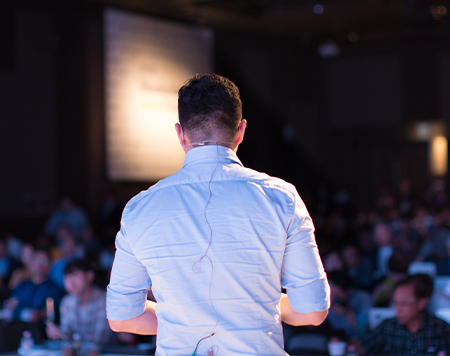 Imagine preparing a class presentation for weeks…
Imagine preparing a class presentation for weeks…
You’ve written every single part to perfection. You know the topic like the back of your hand and feel you’ll get that A.
But the night before it’s due, you think about how embarrassing it would be if you forgot something during the presentation. You toss and turn, waking up periodically throughout the night.
On the big day, you feel anxious, and your heart starts racing. You start to hyperventilate. The fear is so overwhelming that you email your professor to tell them you’re sick and can’t make it.
Sound familiar?
If so, you may be struggling with performance anxiety. Performance anxiety, also known as “stage fright” or “performance nerves,” is a particular type of anxiety.
It commonly occurs in contexts like public speaking, musical performances, sports competitions, acting, or other situations where others evaluate or observe your performance. Performance anxiety can affect individuals of all skill levels, from beginners to experienced professionals.
Performance anxiety can manifest both physically and mentally. Physically, you may experience increased heart rate, sweating, trembling, dry mouth, difficulty breathing, nausea, or an upset stomach. Mentally, you may feel fear, dread, or self-doubt as you worry about making mistakes, being negatively judged, or embarrassing yourself in front of others.
The fear of negative evaluation and the pressure to perform well can lead to a cycle of anxiety, where anxiety becomes a significant obstacle to performing at your best.
 But there’s good news!
But there’s good news!
Performance anxiety can be resolved, and there are multiple ways to attack it.
Cognitive-Behavioral Therapy (CBT)…
…is like a toolbox for your brain that helps you deal with performance anxiety. You see, our minds often fall into negative-thinking patterns, especially when we’re scared of failing or messing up. We tell ourselves things like “I’m going to mess up” or “Everyone will laugh at me.” These thoughts worsen our anxiety.
CBT helps us break these patterns. It teaches us to catch these negative thoughts when they happen, challenge their validity, and replace them with more positive and realistic thoughts, such as “I’m prepared, and I can handle this.” By changing how we think, CBT changes how we feel, reducing anxiety and boosting confidence when it’s time to perform.
Brainspotting…
This is the “one-two punch” for knocking out performance anxiety. Brainspotting is a process that provides exposure to the stressor in a safe, resourceful environment. We focus on responses in our eyes, “brainspots,” and stay on the spot to start processing the traumatic experiences.
You can read more about how it works by reading my page on Brainspotting.
Emotional Freedom Technique (EFT)…
…is a type of therapy often described as “acupuncture without the needles” because it involves tapping specific points on the body to release emotional tension. It helps with a variety of issues, including performance anxiety. Here’s how it works in layman’s terms:
EFT helps interrupt the physical symptoms of anxiety. The technique uses tapping on certain body points that are believed to be connected to energy channels, called meridians. By tapping on these points while thinking about your specific fear or stress, you can send calming signals to the part of the brain that controls stress, effectively “short-circuiting” the stress response.
This method helps you change your body’s physical response to anxiety, calming those racing thoughts and jittery nerves. Essentially, EFT allows you to reprogram your body’s response to stress and fear, turning down the “alarm” set off when facing a high-pressure situation.
Imagine it like this: you’re about to step out on stage, and your body’s alarm system is blaring, “Danger, danger!” EFT is like walking up to that alarm and turning the volume way down, allowing you to perform without the distracting noise of anxiety.
Take control of your life and explore new paths to reduce anxiety.
Schedule a free 15-minute consultation or 50-minute therapy session today: (407) 912-4177.
Let’s embark on this transformative journey together.

